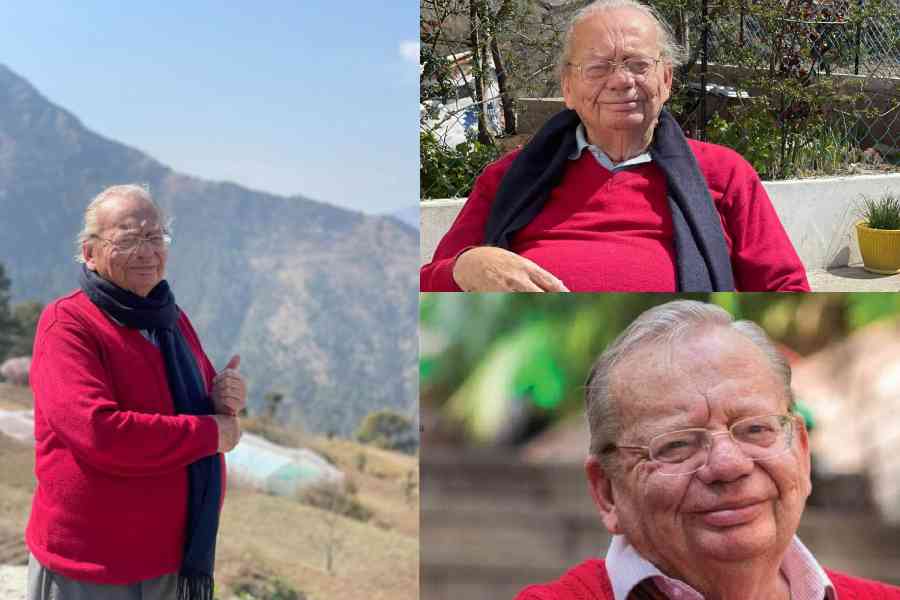“Ah, Calcutta! I used to visit Calcutta very frequently. I came for about five years in succession for one of your lit fests — the Tata Steel one (The Tata Steel Kolkata Literary Meet). And I think The Telegraph was involved in them too,” says Ruskin Bond when we call him for a chat, on a stiflingly hot Friday morning in the city. It is bordering 35 degrees outside with the sun shining in all its dehydrating glory when I dial the number to Ivy Cottage, Landour, and one of the first things Mr Bond remarks on is the Calcutta heat, unbearable at this time of the year. Not so much for him, though, as cool and placid as the hills of Mussoorie he so loves, filtering into his tone and the tenderness with which he speaks to me.
We are to talk about the author’s new book Life’s Magic Moments — releasing tomorrow in honour of his 91st birthday — but the conversation inevitably veers off-course. What follows is half an hour of gentle meandering through memory lanes, tales of childhood and change, ghost stories, and the joy of small, ordinary things.
By the time we hang up, the sun is still blazing outside, but something about the day feels softer to me, as if touched by the hush of hill winds or the warmth of a well-told story.
For, to generations of Indian readers, that is what Ruskin Bond is. A voice that brings comfort, a constant source of happiness in a world that is subject to change. A reminder that magic isn’t always grand, but caught in between the little things, just like the title of his new book. And with this new collection, he offers us yet another gift — a gentle nudge to pause, to look around, and to find joy in the ordinary.
Highlights from our conversation:
I wanted to wish you a very happy birthday in advance and congratulate you on the new book…
Oh, thank you so much. This is the little Penguin book, Life’s Magic Moments. There are usually two or three books that come out on my birthday, and this is a new one. It will be officially launched on Monday, the 19th, though I think it’s already got into the bookshops!
I know you look forward to spending your birthday with readers every year, but I understand that’s not on the cards this time…
Yes. We are not doing a public launch or birthday celebration this year because of all the recent tragic events in Kashmir. But the book will go out, and I hope it will be enjoyed by readers old and new.
Life’s Magic Moments is a very different sort of collection in comparison to your previous anthologies. It reads like excerpts from a diary, like fragments of thought collected from a day and kept away carefully. Was the title a conscious choice?
You’re right, it is like a diary or journal. And I do often keep a journal. I wake up every morning at about seven or eight o’clock, and that’s the best time to write. I sit in the sun — something you won’t be doing in Calcutta, you’ll be sitting in the shade! — but I’ll be sitting in the sun because it’s still quite chilly at times up here. And I write two or three pages. And it’s usually very personal thoughts, you know, ‘quiet thoughts from a quiet fellow’, like I say in the book. That’s what this little book consists of, really, reflections and meditations, and, you know, just looking back on life, the past and the present. And so it’s a little bit of homespun philosophy, I suppose.
The pieces are about small, quiet pleasures — flowers, earthworms, the spring near your old home that you write about. Do you think the younger generation still notices these things?
I try to get them interested. And I do get a good response from many young readers. Every week, I’ll get half a dozen letters, and they’re usually handwritten because they know I write by hand too. And I can’t, of course, reply to all the letters I get, but they are letters that in many ways respond to what I’ve written.
Sometimes they’re from school kids, or sometimes they’re older people, and I think some people like to, for a change, get away from reading about the hurly-burly and all the conflict that’s going on everywhere, here and elsewhere in the world, and read about flowers and gardens and birds and the more restful aspects of life on this planet. And maybe it calms them down a little bit and makes them feel that life isn’t such a miserable thing after all.
Because a lot of people are unhappy. At least, a lot of people that I meet are. And I do think maybe it’s possible to be happy if you turn your attention to some of the things that seem unimportant, but which are a part of our existence.
You’ve written a great deal about literature, the books that you love and have shaped you through the years, particularly (Emily Bronte’s) Wuthering Heights. You have a whole section dedicated to great writers in the book. How enduring do you think is the impact of such literature, and how has your understanding of such work shaped your own personal philosophy towards life and writing?
You know, it’s funny… sometimes my publishers say I write too much about books! It’s a weakness of mine. Because maybe in many ways, I’m a reader first and a writer second. I was a bookworm as a boy, and I’m still a bookworm. And all my life, I’ve given priority to reading. Very often, I have some work to do, or maybe I have a story to finish or a book to work on, but if a book I like comes my way, or if I’m in the middle of it, then I won’t put it down. I’ll give priority to the book I’m enjoying.
Wuthering Heights, as I mentioned in the book, is one of my favourites. I’ve read that book about three times over the years. And whenever I’ve read it, I’ve stayed up all night or half the night until I finished it. I somehow can’t put it down, even though it’s become such a familiar work now.
As for the impact you speak of, very much, I should think. For me, it all goes back to my school days. I had a fairly lonely childhood and, as a result, I did turn a lot to books for company. We had a pretty good library in my school and, because I was interested in books, they made me the librarian! So, for two or three years, the library was my home, or my escape route. My escape from classrooms and dormitories, because I had the keys.
And I read just everything, you know, from novels of the contemporary writers of that age, to plays, poetry, to whatever else was there. I’ve always been a nebulous reader. I would even read comics and magazines, and papers. I still read the papers, I get four newspapers in the morning. And of course, I did read the classics as a boy. I worked my way through the works of Dickens. I read everything, David Copperfield, Nicholas Nickleby, Oliver Twist, Bleak House, all of them. And the Brontes. And there were some authors I didn’t take to if I found them tedious, like Thomas Hardy. We had to study him. And I think if you have to study a particular writer, it often makes you lose interest in them in the first place. So I apologise to the kids who sometimes have to read my stories in class! But they’re very polite about it and say, “No, no, we enjoy them!”
But anyway, I read what I enjoy. I never force myself to read a book because I’m supposed to or because everybody else is reading it. And if I find myself struggling on chapter two of James Joyce’s Ulysses, then I certainly won’t go any further! And there may be people who can read it from beginning to end, but I think they must be sado-masochists to suffer all that!
You mentioned turning to books for company as a child, and also write of the solitude in the life of the writer. At this point in your career, do you see that solitude as a necessary condition for creativity, or something the writer must continually learn to live with and perhaps draw meaning from?
I think loneliness is part of the writer’s life. If you look at the childhood of many famous writers, they often had lonely childhoods or difficult childhoods, or grew up in broken families. And it makes you, in a way, more sensitive to what great writers have written. And I think it does make you more reflective.
And then, of course, a writer often has to seek solitude because writing itself is quite something. Of course, a good professional writer should be able to write anywhere. I’ve written in a railway compartment or in a room full of noisy schoolboys. But still, I think one would rather be writing in one’s own home. So, I think, yes, the environment does help too. I did spend five years in Delhi long ago in the 1960s, and I did not do very much writing during that period. And now, I see, living in the hills, I found I could write much more. So, I think it does make a difference in your surroundings and your environment and the life around you. But books, too, have inspired me, and other writers. I think I’ve been influenced a great deal by other writers. Not that I wanted to write the same things or write like them, but I just wanted to be one too. And I’m still discovering writers. I’m always looking for forgotten or neglected writers from the past who had something to offer.
Publishing is a very commercial world. Publishers have to sell books. So they look for what is saleable. And sometimes good writing isn’t always saleable.
And certain kinds of writers are more subjective writers. The ones who write out of loneliness or out of their own lives. They have some difficulty in getting published and finding readers on the same sort of mental level.
So, really, there are all kinds of writers, and I just try to be myself.
You mentioned publishers making a great deal of fuss about what is saleable and what is not, which brings me to my next question — the life of the writer sometimes also comes with fame, and in your case, it certainly has brought a lot of fame. But at one point in the book, you say that the fame you have achieved wasn’t the one you fantasised about as a boy. Could you tell me a little more about that?
Well… let me put it this way. My first book, The Room on the Roof (1956), which I wrote when I was 17 or 18, took me a couple of years to get published. It was sort of an adolescent writing about adolescence. So, I think what has kept it going, alive and fresh, over the years, is the fact that it was written by a boy who was discovering the world around him. It’s going on 70 soon, and next year, Penguin will celebrate its 70th anniversary. They’ll bring out a special edition, I think. And the fact is that it’s selling much better now than when it was first published. That’s the irony of it and the good thing about it. It was a very personal, sensitive novel, but when it was published, nobody actually bought it. Commercially, it was a failure, but somehow it survived over the years.
Now people are reading it, and it’s doing very well. It was on the bestseller list not so long ago, 70 years after it first came out. So strange things do happen in the publishing world and in the writing world. There’s always an element of luck there, too. Sometimes we expect a lot from a particular book, and nothing happens. And then you write something else, which seems very light and unimportant, and it takes off. You can’t really predict these things very easily.
What do you think is the driving force behind that fame, though? I think in your case, people almost always associate you with that gentle, warm tone that you write in… is that simply who you are — that ‘cheerful disposition’ you write of?
Yeah, I think people want that. I get letters from people who say they like to read me because they feel restful or calm when they’re reading my stories. Even when they’re reading a ghost story, they say it doesn’t frighten them. I had a complaint from a young girl of about 10, who said, “Mr Bond, I like your ghost stories, but they’re not scary enough! Can’t you make them more frightening?” Well, it’s hard to frighten kids nowadays! They’re pretty thick-skinned. They grow up on television and films that are pretty rough at times. So kids don’t frighten easily. They want a thrill very often. So now and then I try to thrill them, but I think I’m better off writing about flowers and ladybirds and the whistling thrush. That’s what I prefer writing about. But sometimes you’ve got to try to tell an exciting story.
I guess in many ways I’m an essayist at heart, rather than a novelist. Although my short stories sort of fall in between. Part essay, part fiction. And that makes them maybe a little different. A writer must try to be different anyway, even when being himself or herself.
Finally, you write very fondly of rambling and your childhood dreams. Looking back now, how do you think those early dreams and present-day ramblings have shaped the writer you have become?
Yes, I used to ramble a lot. I used to walk around and go on hikes and treks. In fact, as a boy in Dehradun, I used to discover towns and cities that way. Even in Delhi and London, I’d just walk everywhere and get to know the city. I was always tramping around!
But I can’t walk very far now. It’s enough struggle to get up my steps, which are the worst steps in Mussoorie. But it’s all right. I don’t really miss it. Because I can live on pleasant memories. After all, the main thing is to be able to read what I want to read and write what I want to write. And though my vision is poor now, if I put my nose in the book, I can write. And I use a lined writing pad so that I don’t go off the page when writing. Otherwise, on a blank, unlined page, the writing will go all over the place. So these little problems are there, but I manage them.
I think life now has become, also, very much a part of managing things. Because when you’re in your 90s and you’re at a disadvantage, physically and visually, you’ve got to learn little tricks of managing things — you know, not bumping into tables and chairs or taking a toss, as I did not so long ago. Fortunately, I was once a football goalkeeper. So when I do take a toss, I manage to slide instead of falling with a thump, and get away with it!










